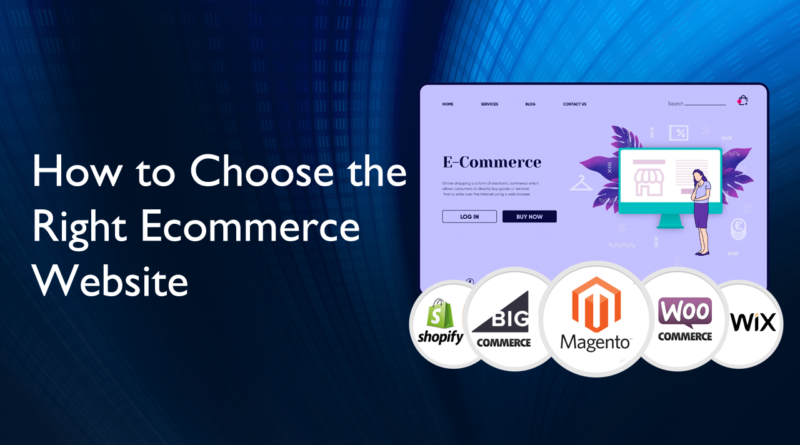How to Choose the Right Ecommerce Website Builder for Your Online Store
Introduction:
In today’s digital age, establishing a strong online presence is essential for the success of any business, especially for online stores. However, with numerous options available, choosing the right ecommerce website builder can be overwhelming. This comprehensive guide is designed to help you navigate through the selection process, ensuring you find the perfect website builder that aligns with your goals and business requirements.
Identify Your Business Needs:
Before delving into the world of ecommerce website builders, it’s crucial to assess your specific business needs and goals. Consider the following factors:
1. Assess Your Product or Service Offerings:
Take into account the type of products or services you offer and their complexity. Some website builders specialize in specific niches, while others cater to a wide range of industries. Identifying the right solution that aligns with your offerings is crucial.
2. Determine Your Target Audience:
Understanding your target audience’s preferences and behaviors is essential when selecting a website builder. Look for features that enhance the user experience and align with your customers’ preferences.
3. Define Your Budget and Resources:
Establish a budget for your ecommerce website, considering expenses such as hosting, domain registration, additional plugins, and ongoing maintenance. Additionally, determine whether you have in-house technical expertise or the need for external assistance.
Key Factors to Consider When Selecting an Ecommerce Website Builder:
When selecting an ecommerce website builder, there are several key factors to consider. These include:
A. User-Friendly Interface and Customization Options:
Opt for a website builder with a user-friendly interface and easy customization options. Features like drag-and-drop functionality, pre-designed templates, and customization options for branding can save you time and effort.
B. Payment Gateways and Integration Options:
Ensure that the website builder is compatible with popular payment processors, making it easy to set up and manage online transactions. Integration capabilities with CRM and inventory systems are also crucial for seamless order management.
C. Mobile Responsiveness and Optimization:
Given the increasing number of users accessing the internet through mobile devices, having a mobile-responsive website is vital. Look for a website builder that offers responsive design for different devices and a mobile-friendly checkout process.
D. SEO Features:
To enhance your online store’s visibility in search engine results, choose a website builder that provides customizable URLs, meta tags, and built-in SEO tools for optimization.
E. Scalability and Flexibility:
Consider the growth potential of your business and determine if the website builder can handle increased traffic. Look for options to add new features or functionalities as your online store expands.
F. Security and Customer Privacy:
Protecting your customers’ sensitive information is paramount for building trust. Choose a website builder that offers SSL certificates for secure transactions, regular security updates, and compliance with data protection regulations.
G. Customer Support and Technical Assistance:
Check the availability of customer support channels and resources for troubleshooting and guides. Responsive customer support can be invaluable when facing technical issues.
Research and Compare Different Website Builders:
To make an informed decision, conduct thorough research and compare various ecommerce website builders. Consider the following popular options:
Shopify:
Shopify is a powerful and user-friendly platform that offers a wide range of features such as customizable themes, secure payment gateways, inventory management, and marketing tools. Known for its ease of use and extensive range of features, Shopify is a popular choice for both small and large online stores.
WooCommerce:
WooCommerce is a highly customizable and user-friendly e-commerce platform for building online stores. It seamlessly integrates with WordPress and offers a wide range of features and extensions to sell physical and digital products, manage inventory, handle payments and shipping, and much more
Magento:
Magento is an open-source e-commerce platform that provides online merchants with a flexible shopping cart system and control over the look, content, and functionality of their online store. It is known for its scalability, performance, and extensive features, making it a popular choice for businesses of all sizes.
BigCommerce:
BigCommerce is a popular e-commerce platform that allows businesses to create and manage online stores. It provides a variety of features and tools to help businesses sell products and services online, such as customizable templates, secure payment options, and inventory management tools
Wix:
Wix is a popular website builder that allows users to create stunning and professional-looking websites without any coding knowledge. With its easy-to-use drag-and-drop editor and a wide range of customizable templates, Wix offers a user-friendly platform to build websites for businesses, individuals, and even e-commerce stores. Wix is a great choice for small to medium-sized businesses.
Assess each builder against the key factors identified and read customer reviews and testimonials to gain insights from real users. Additionally, compare pricing plans and additional fees to ensure they align with your budget.
Determine the Best Ecommerce Website Builder for Your Online Store:
Consider the specific needs and requirements of your business, reviewing the pros and cons of each website builder. Take into account scalability, customization options, customer support, pricing, and integration capabilities to create a shortlist of top contenders.
Test and Trial the Selected Ecommerce Website Builders:
Take advantage of free trials or demos offered by the shortlisted website builders. Experiment with different features and functionalities to gain a hands-on experience. Seeking feedback from team members or potential users can provide valuable insights into usability and ease of navigation.
Make an Informed Decision and Sign Up for the Chosen Ecommerce Website Builder:
Review the pricing plans of the selected website builders and choose the most suitable option for your budget and requirements. Set up your online store using the chosen website builder, customize the design and layout to reflect your brand, and integrate necessary payment gateways and other required functionalities.
Conclusion:
Selecting the right ecommerce website builder is crucial for establishing and running a successful online store. By identifying your business needs, considering factors such as customization options, mobile responsiveness, SEO features, scalability, security, and customer support, you can make an informed decision. Thorough research, comparison, testing, and feedback-gathering ensure that you find the perfect fit for your online store. Remember, ongoing evaluation and optimization of your online store are essential to adapt to changing market dynamics and customer preferences. If you are experiencing challenges in configuring your ecommerce platform, it is highly recommended to consider outsourcing to a professional ecommerce service provider. This will help alleviate any difficulties you may be facing and ensure that your ecommerce platform is efficiently set up and managed.




